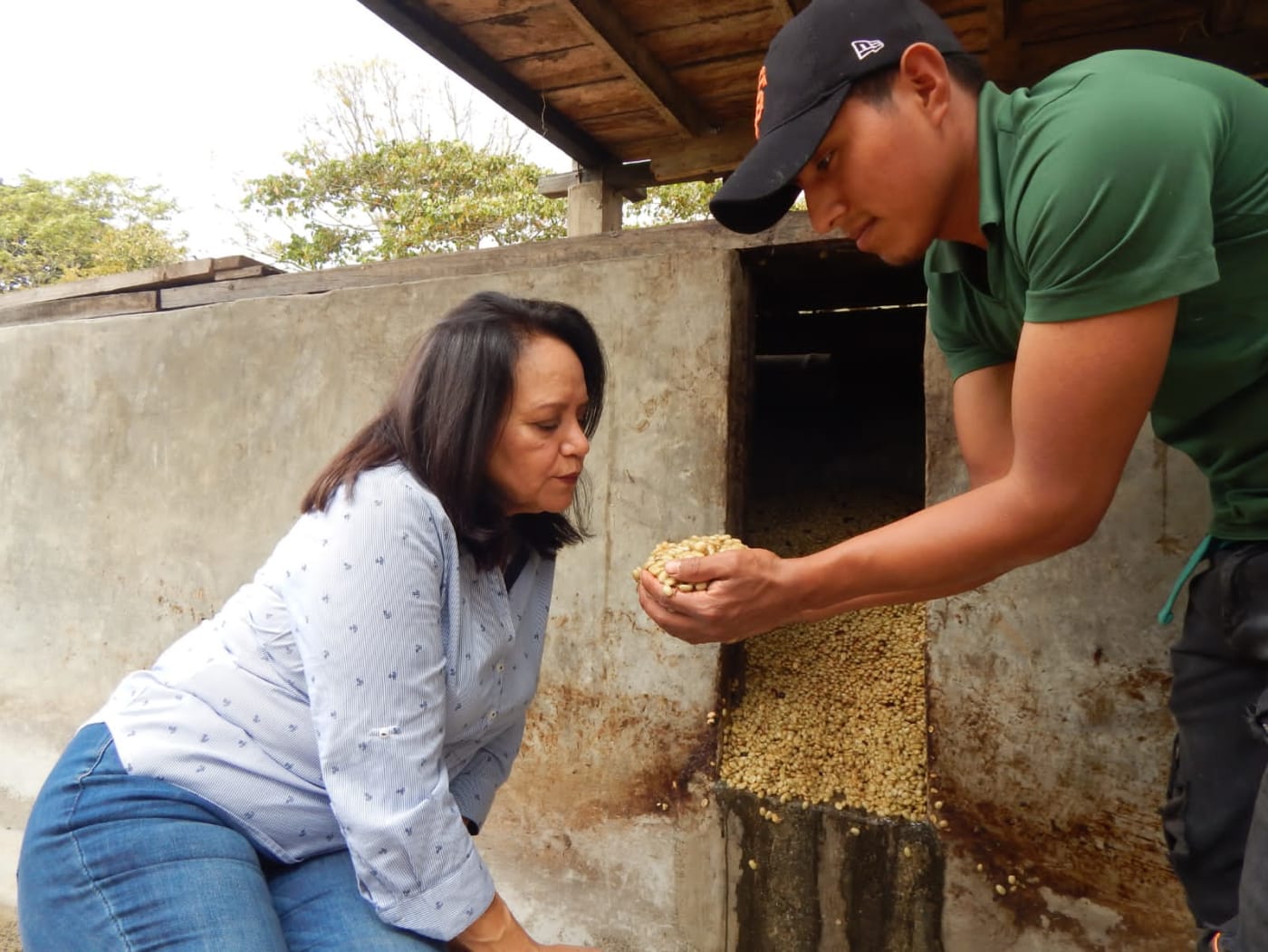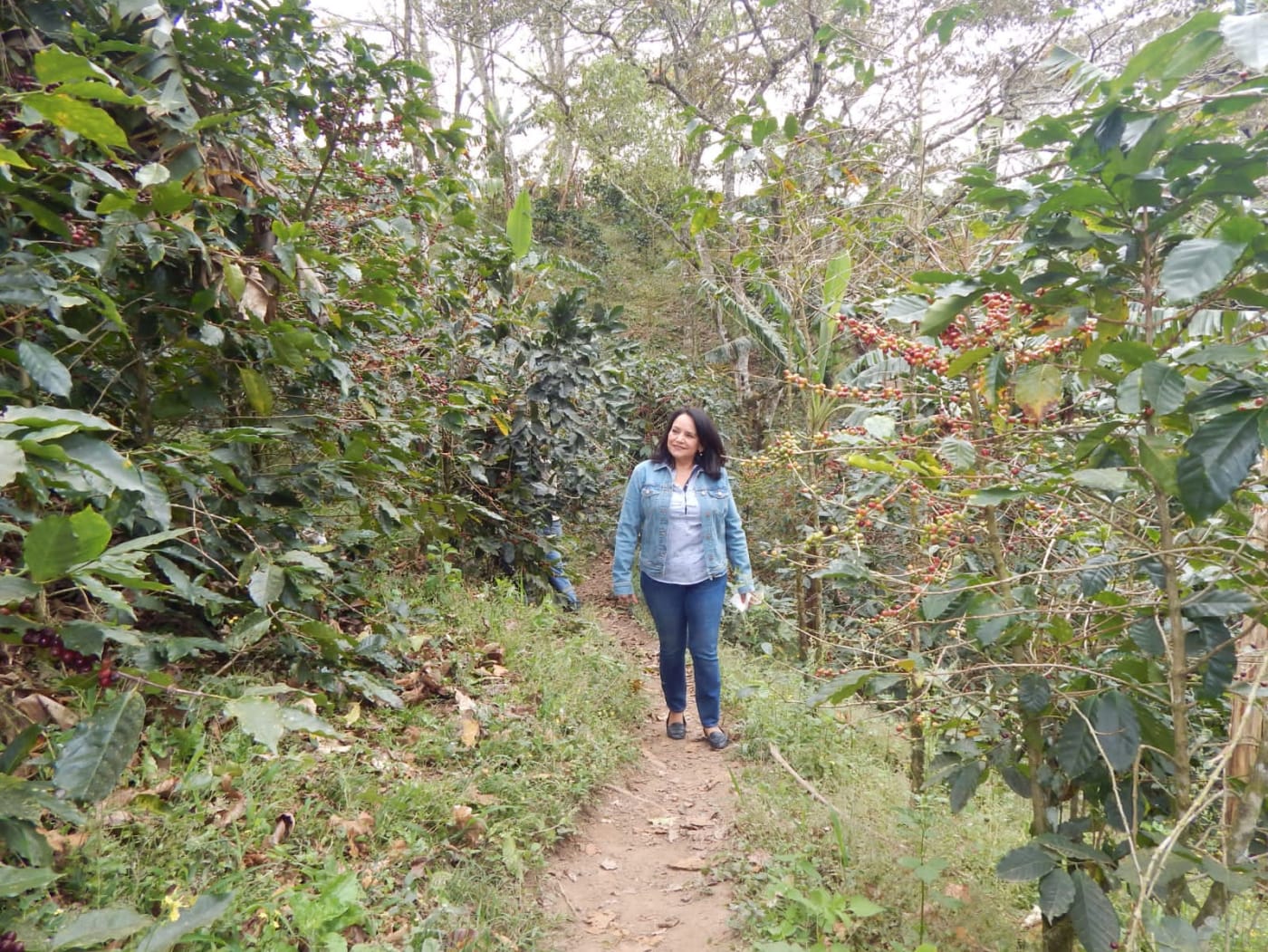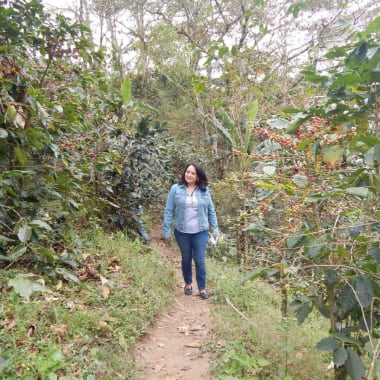-
Producer
-
Maria Esther Ponce
-
Farm/Coop
-
La Esperanza
-
Country
- Nicaragua
-
Region
-
Dipilto
-
Altitude
-
1400m above sea level
-
Variety
-
Process
-
Harvested
-
January 2023
-
Importer
-
Caravela
-
Body
-
-
Acidity
-
-
Tasting notes
-
Cherry, dried cranberry, almond
-
Roast style
Nicaragua
La Esperanza
Maria Esther PonceMaria’s caturra is back again this year! With the characteristics of a classic coffee from this region: sweet with notes of cherry, dried cranberry, and sweet almonds.
Maria Esther’s Nicaraguan Caturra is back again this year! It has all the characteristics of a classic coffee from this region: sweet with notes of cherry, dried cranberry, and sweet almonds. A real all-day-drinker coffee.
Maria has been directly involved in coffee production for 6 years. Her passion stems from her parents and grandparents, who have worked at Finca La Esperanza for over 80 years. This farm, which name means ‘the hope’, was the family’s chosen medium towards a fair and decent living.
Maria Esther and her siblings all moved to live aboard. Every time they returned for a visit, they would get involved in this or that during harvest and process, gradually gaining experience. Eventually, she “took the baton” and now is in charge of the business, with the support of her husband Rodrigo, who is in charge of the financials and logistics, and Elmer, a trusted man who directs the agronomic management.

In Finca La Esperanza, they focus on the varieties that are resistant while producing a high-quality cup, ensuring the profitability and sustainability of the enterprise. Some of the varieties grown to date are Catimor, Java, Catuai, Maragogype and Caturra (the one that makes up this coffee lot).
One of the things Maria Esther enjoys the most is the aroma—it brings back memories of childhood—and knowing that the product has been grown under her leadership, at La Esperanza.

Learn everything about this coffee:
Ethical, traceable sourcing
This page has all the sourcing information (variety, process, region, story, importer, and more) that our importers share with us, and give us permission to use.
The transparency helps us talk confidently about the quality and background of our product, and it helps you know exactly what you’re buying.
Learn more:
Coffee page transparency legend
Our coffee philosophy
Our business approach
Fresh harvest coffee
We only source and roast coffee from each country’s latest harvest season (so the green coffee is never older than 1 year from the time of picking, processing and packing). This ensures the sensory qualities are always at their peak and unaffected by excessive ageing.
Roasted for espresso and filter (best enjoyed black)
Roast style: omni. Omni roasts are designed to brew and taste great both as espresso and filter. Our omni single origins generally sit on Agtron values in the ~70-60 value range. So, technically, they are somewhere in the lighter side of the medium spectrum.
Designed for espresso and filter brewing. Best enjoyed black.
Learn more:
Our Loring Kestrel S35 roaster
Our roasting style and approach
Best brewed within days 15-49 post-roast
The ‘fresh is best’ saying doesn’t apply to coffee (contrary to popular belief). Waiting before opening and brewing your bag of whole coffee beans helps develop peak flavour and acidity.
But heads up: if you buy pre-ground coffee, brew it as soon as possible.
Learn more:
Our recommended brewing window
Try our custom brewing recipes
Our recipes and ratios are tailored to our coffee sourcing and roasting styles, bringing the best flavour and feel out of each coffee.
For pour over, immersion, and other filter brewing styles, check our brew guides.
For our espresso single origins, we recommend a coffee:yield ratio of 1:3:
- Dose: 20g ground coffee
- Yield: 60g espresso
- Total brew time: ~24-28 seconds
This is just a starting point! We encourage you to experiment, taste, and adjust to find the recipe that you enjoy the most.
Learn more:
Our espresso brew guide (single origin)
Brewing ratio calculator
Packaging and sustainability
- Bags: ABA-certified home compostable (AS 5810-2010)
- Labels: recyclable
- Valves (only on +250g bags): general waste
- Box and tape (online orders): recyclable
Learn more:
Our packaging
Variety
Caturra variety
Caturra is a natural mutation of Bourbon that was originally discovered in Brazil in 1937, considered to be the first naturally occurring mutation ever discovered.
The location
Coffee from Nicaragua
The true potential of Nicaraguan coffee has been hindered by a long history of political instability and natural disaster, however successful programs such as the Cup of Excellence competition and the Nicaraguan Specialty Coffee Association have helped drive the potential of Nicaraguan coffee into real quality production
The Matagalpa region of Nicaragua
The region is named after the capital city, with coffee coming from both private estates and cooperatives
Farm processes
Washed process
Machines are used to remove the flesh from the coffee cherry before being fermented in water, washed again, and finally sun dried. This process tends to result in more distinct, cleaner flavours.
1 brew note from subscribers
Nicaragua La Esperanza Maria Esther Ponce
Adrian’s Aeropress
- 18g
- 94ml
- 5m 0s

Subscribe to a world of coffee
Discover a new single origin coffee from Sample every 1-5 weeks with no delivery fees.
No up-front purchase, and you can pause, cancel, or change plans at any time.
Available to order online this week:

Rwanda Kibirizi
Flavours of mandarin, raisin, apple
Body Acidity
Washed Bourbon
June 2025 harvest
Roasted omni for filter and espresso
Rwanda Kibirizi online
Kenya Karimikui
Flavours of blood orange, blackberry, plum jam
Body Acidity
Washed Batian, SL28, SL34, Ruiru 11
November 2024 harvest
Roasted omni for filter and espresso
Kenya Karimikui online
Peru Miguel Estela
Flavours of honeydew melon, white grape, marmalade
Body Acidity
Washed Marshell
August 2025 harvest
Roasted omni for filter and espresso
Peru Miguel Estela online
Colombia Rigoberto Chavarro
Flavours of brown sugar, wine gum, candied stone fruit
Body Acidity
Washed Pink Bourbon
February 2025 harvest
Roasted omni for filter and espresso
Colombia Rigoberto Chavarro online